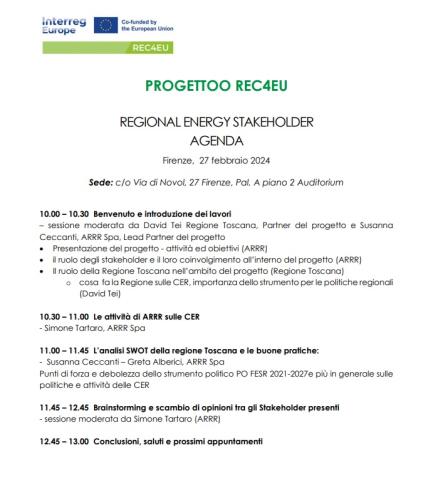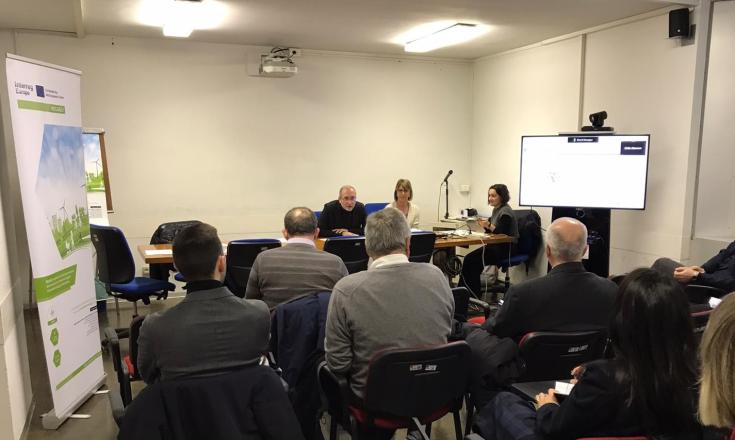REC4EU Italy meets regional stakeholders in Florence
On 27/2/2024, the second meeting among local stakeholders of REC4EU project was held at the Tuscany Region (TR) headquarters in Florence. The event, organized by the TR and ARRR, was attended by about 40 stakeholders (including present and remotely connected) who were called to give their input for the potential improvement of the local governance in the field of RECs. The participants belonged mainly to associations, institutions, universities and other entities that may potentially be interested in the development of RECs. See the agenda below

Tuscany Region (David Tei)
He outlined the current status of RECs in Tuscany and announced the 20 mil. euro regional RP ERDF 2021-2027 call for proposals, which will be published in the coming months. In order to achieve the 2030 energy transition goals (45% RES compared to total energy consumption) the regional model includes three basic steps:
- installation of RES (with attention to landscape constraints),
- energy efficiency of energy-intensive buildings, and RECs, promoted through Council Resolution 336/2022, Regional Law 42/2022, European projects, and
- animation of the territory thanks to the collaboration of ARRR.
Dr. Tei emphasized that a more efficient management of resources, in addition to economic and environmental benefits, can contribute to fight energy poverty.
ARRR (Simone Tartaro)
He presented the promotion and awareness raising activities on RECs (CERTO campaign) and the map of municipalities where ARRR has implemented such activities (more than 50 percent).
In addition to highlighting the willingness of ARRR and TR to support entities, municipalities, associations etc. on different levels (technical, regulatory and economic), he emphasized the social aspect that RECs must encompass by re-evaluating the sense of community as the added value of a REC, offering not only economic benefits related to incentives but other ancillary services (i.e. installation of shared electric car charging, space sharing and neighborhood improvement etc.).
ARRR (Susanna Ceccanti and Greta Alberici)
They outlined the European REC4EU project activities and objectives (see link to project website). The SWOT analysis (drafted by ARRR and TR) was described showing the strengths, weaknesses, opportunities and threats of the activities and the policy instruments both at regional (especially RP ERDF 2021/2027) and national level which affect the local level but which can only be changed/improved only by national bodies. They also emphasized the importance of interregional exchange among REC4EU partners and the use that can be made of the identified good practices that can provide each local reality with good insights.
Discussion and brainstorming
During the brainstorming among participants, some interesting issues emerged. They will be the subject of further study and discussion with GSE (Energy Services Manager) and MASE (Ministry of Environment and Energy Security), including:
- the role of agricultural activities in the development of RECs
- the role of municipalities, in relation to the expertise they have internally, for the purposes of launching and managing a REC, including the support of collaboration they have with businesses
- the role of the provinces
- the business economic aspect in the establishment of a REC and the social aspect, i.e. to fight energy poverty
- the right type of communication for the engagement of citizens aimed also at attracting households, beyond the participation in incentives
- how to educate people to optimize energy consumption and use energy intelligently
- how to involve large public or mixed enterprises or energy utilities, since they cannot be members of a REC (nonprofit coordinating role, REC management, third-party producers)
- what role can have large enterprises (making any surplus energy produced available for the REC)
- to whom can the administration and management of a REC be entrusted
- on whom can entities, associations etc. call for precise answers
- how to strengthen a REC once it is established and how to foster its valuable creation in the area
Conclusions
The participants highlighted the interest in the establishment and maintainance of the working table activated by the Region as a moment of comparison and added that it is necessary to create a network in order to be able to achieve the objectives set.
One of the objectives of the REC4EU project is precisely to establish a pathway at regional level to put at the service of associations and entities all the inputs coming from both the TR and from the partners in other countries, sharing together good practices, models, procedures, etc...
Speakers were invited to convey through the TR and ARRR all questions or doubts to be asked at national level (GSE, to the Revenue Agency, MASE etc.) trying to be supportive directly or attempting higher level interlocutions.
The meeting ended by giving appointment to the end of June 2024 for an update of the table.
Italian version
